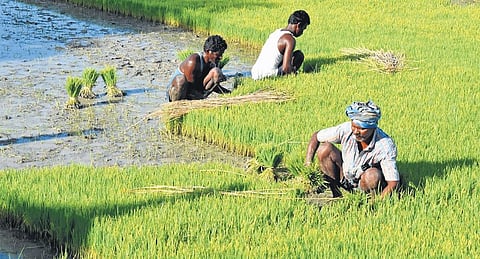

GUNTUR: In view of the severe water shortage, the Guntur district administration is advising farmers to cultivate pulse crops during the Rabi season and adopt water-efficient aerobic cultivation methods.
A substantial 1.844 lakh acres are currently under cultivation, with 27,000 acres along the Krishna Western Delta canal, 3,794 acres under micro-irrigation lakes and more.
Unfortunately, the available water resources in major projects like Srisailam (10.20 TMC), Nagarjuna Sagar (26.13 TMC), and Pulichintala (10.29 TMC) are limited and allocated solely for drinking water purposes.
The prevailing severe rain deficit in the State over the past months has led to insufficient water reserves in major projects for agricultural irrigation.
While traditional crops such as mirchi, paddy, and cotton are common in the district. The officials are strongly advising farmers to shift towards cultivating pulse crops, such as bengal gram and green gram, which consume less water.
District Collector Venu Gopal Reddy has reviewed the situation, emphasising the need for awareness programmes at the ground level to guide farmers and prevent potential losses.
Despite the challenges, the officials are planning to distribute quality seeds for legumes and pulses through Rhythu Barosa Kendrams (RBK) centres.
Meanwhile, farmers who have already sown water-intensive crops like cotton and chilli are facing distressing situations. Kanthaiah, a Guntur farmer, lamented the withering of his cotton crop due to the absence of rain, forcing him to consider replacing it with a less water-intensive alternative.
The officials, along with senior scientists and experts, are conducting awareness programmes to educate farmers on water-conservation methods in agriculture.
They are encouraging the adoption of micro-irrigation and other water-efficient techniques to mitigate the impact of the water shortage on agricultural practices.